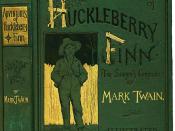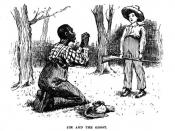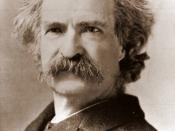Perhaps the greatest battle in The Adventures of Huckleberry Finn by Mark Twain is that of the titular character with the society he lives. As he matures throughout the book, Huck cultivates ethical beliefs and a social conscience which he understands to be quite different from that of his society. In the beginning of Huck Finn, social standards are beginning to increasingly influence Huck. However, as Huck is forced to flee from society, he finds that what is socially acceptable and his own beliefs are often in contrast. Huck is faced with this moral dilemma but ultimately chooses his own principles over what society prescribes; this is represented as his personal triumph over a society Twain depicts as fundamentally corrupt. In the final stage of the book, society returns in the form of Tom Sawyer, but through his experiences on the river, Huck has matured; he is better able to distinguish between societal beliefs and his own, and choose the latter.
At the commencement of the novel, Huck is being drawn into the commonly held social views of his town of St. Petersburg, even though he actively tries to resist this. Huck explains to the reader repeatedly that he dislikes becoming "sivilized", yet he is ever more concerned with the familiar institutions that are part of society, such as school and church. Huck's frustration with the petty rules and order of society as compared with his previous, carefree life is illustrated by his statement, "Well, then, the old thing commenced again. The widow rung a bell for supper, and you had to come to time. When you got to the table you couldn't go right to eating, but you had to wait for the widow to tuck down her head and grumble a little over the victuals" (Twain 2), which...


